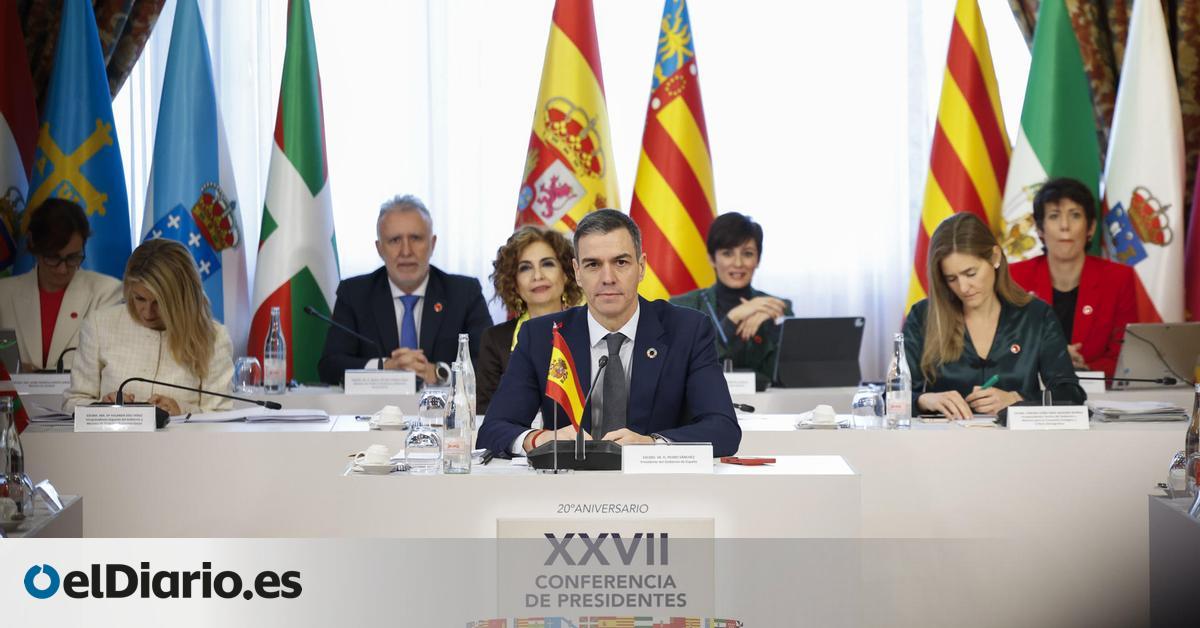
The Government calls on the Autonomous Communities governed by the PP to apply the instruments offered by the Housing Law to confront the rental crisis that has caused a wave of tenant protests in recent months. According to sources from the Executive, at the beginning of the Conference of Presidents Pedro Sánchez told the group of regional presidents “to make use of the Housing Law, whose tools are giving good results where they are applied and are contributing to reducing the price of housing.” rentals”, in reference to Catalonia.
The central Executive has also requested the support of the PP to reform the Land Law with the aim of accelerating the construction of affordable housing, as well as “adapting current regulations to the challenge of climate change.” And it has also proposed to shield “the public and social nature of housing financed with public resources permanently and irreversibly, to ensure that the public affordable housing stock continues to grow and reaches the 20% that the most advanced European countries have in this matter. ”.
Housing is, in fact, the item on the agenda that Sánchez prioritizes for the Santander summit, which he even tried to make it monographic given the emergence of price developments in Spain. The expectations to reach something resembling a consensus, however, were minimal at the beginning of the meeting and in the Moncloa they expected a frontal rejection of the popular ones as an opposition strategy by Alberto Núñez Feijóo.
Sánchez urges a pact on immigration matters
The Government has also demanded that the autonomous communities of the PP “agree once and for all on a shared solution to the problem of the distribution of unaccompanied minors through objective criteria, appealing to inter-territorial solidarity”, after the failure of the three-way negotiations. between the PSOE, the PP and the Canary Islands government due to the Popular Party’s refusal to reform the immigration law in the terms proposed by the Executive. Sources present at the meeting consulted by elDiario.es rule out any agreement on this matter.
This Friday’s appointment, in fact, comes preceded by Feijóo’s PP blocking the reform of the immigration law to systematize the reception of migrant minors who are overcrowded in the Canary Islands waiting for a destination in the Peninsula. The PP delegated responsibility to the regional barons, who also demanded that migration be one of the points on the agenda of this Friday’s meeting.
But the agreement will not be possible. And that the Government of the Canary Islands (shared by the Canary Coalition and the PP) has arrived at the meeting with an agreement with the Government of Euskadi under its arm to seek an urgent and temporary solution to the situation of the kids. The Canary Islands president, Fernando Clavijo, said at the entrance that he hopes to achieve the commitment of the PP to support the approval of this system.
Forgiveness of regional debt
One of the points on the agenda indicated in red by the regional presidents of the PP has to do with the reform of the regional financing system, with which the popular ones have made a common front against the Government in recent months due to the Executive’s commitments. with its Catalan independence partners. And according to government sources, Pedro Sánchez has also made a move on this point at the beginning of his speech at the closed-door meeting of the Conference of Presidents.
According to these sources, the Government will call all the communities next January to negotiate the assumption of the regional debt. The person in charge of negotiating will be the first vice president and Minister of Finance, María Jesús Montero, in a Fiscal and Financial Policy Council (CPFF).
Sánchez thus addresses one of the fundamental issues of the investiture agreement that allowed Salvador Illa to be elected president of the Catalan Generalitat. The forgiveness of Catalonia’s debt caused a political storm and criticism from the PP, but the Government promised to replicate what was agreed with the Generalitat in the rest of the regions.
Thus, the Government proposes that the CPFF allows us to achieve “a new model of autonomous financing that reconciles multilateralism and bilaterality, protects solidarity between territories, and guarantees that all communities receive more resources than they receive today.” In addition, the Executive asks the regions to “reprogram a part of the European cohesion funds FEDER and ESF+ to give the territories affected by DANA an additional line of help. This is an option that is already contemplated by European regulations and that could contribute to strengthening the measures already adopted by the Government of Spain and the Government of the Generalitat Valenciana to rebuild and relaunch the economy of the affected territories.”
Before that meeting, and together with the president of Cantabria who served as host, Sánchez has claimed the balance of forty years of the state of the autonomies. “It has meant progress, solidarity, equity and responses to citizens, who understood that the democratization of our country was linked to the recognition of diversity. And that union in diversity has only brought good things,” he assured.
The president has described the photo of all the regional presidents, including the Generalitat and the Lehendakari, together with the head of State as “a very powerful image that gives certainty and security to citizens.” And he has called for closer cooperation between administrations in the middle of the political battle that pits the Government against the PP, which holds the majority of regional executives. “We have to continue the path of cooperation and collaboration to provide answers and assurances to citizens in everything that affects them.”
More public health university places
In health matters, the Government has committed to “consolidate and increase the financing of new places for health professions in public universities, as long as there is a firm commitment from the autonomous communities to contribute sustainably to their co-financing.”
Spain has doubled the number of centers that offer a degree in Medicine and other health training in just over a decade. Regional executives want to implement them in their territories and private companies see business due to the great demand. Public officials warn that increasing supply creates dysfunctions because the shortage is not due so much to the lack of university places but to the working conditions of Primary Care professionals, for example.
The Government has also announced that it will transfer to communities “an extraordinary 223 million euros at the beginning of 2025 to finance the adoption and development of new health solutions based on Artificial Intelligence. “To improve patient care and make better use of healthcare workers’ time.”
Source: www.eldiario.es

